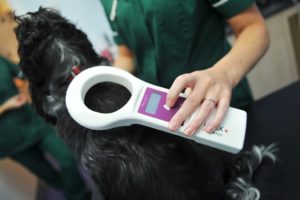
From the 6th April 2016, a new law will make microchipping dogs compulsory!
This year marks a change in how you register your pet dog. From 6th April 2016 onwards ALL dogs from 8 weeks and over must be microchipped. The Government introduced the law to:
- help reunite people with lost or stolen pets
- encourage responsible pet ownership by tracking down the owners of vicious or illegal dogs
- help tackle puppy farming
- facilitate the reporting of hereditary health problems
How does it work?
Microchipping dogs is a very simple procedure. The microchip, which is the size of a grain of rice, is implanted using a special device in the skin of your dog’s neck. It is a perfectly safe and quick procedure that needs to be performed by a vet or suitably trained person. The details of the microchip will be officially registered with an approved microchip database, which will hold up-to-date information about you and your dog.
Dogs will need to be microchipped and registered with their keepers’ contact details. All keepers, including breeders, must keep these details up to date.
Breeders must also microchip their puppies by eight weeks old and before they are transferred to a new keeper, who will be responsible for updating their pet’s microchip details.
The only exemption from the requirement is where a vet has certified in writing that a dog is unfit to be microchipped.
Why is microchipping dogs necessary?
A microchip makes it much easier to reunite a lost or stolen dog with its owner.
Microchipping will reduce the burden on animal charities and local authorities and help protect the welfare of dogs by promoting responsible dog ownership.
When a missing pet is found, an animal professional (for example a vet or dog warden) will scan the pet revealing the microchip’s unique 15 digit code, and contact the microchip database your pet is registered with. The microchip data base company will then perform some security checks before releasing your contact details to the animal professional – so that your pet can be reunited with you.
You must also ensure your pet has an ID tag, by law all dogs should wear a tag.
What if I choose not to Microchip my dog?
Basically, you will be breaking the law!
Once the new rules come into effect, if a dog without a microchip comes to the attention of the authorities, its keeper may be served with a notice requiring the dog to be microchipped, and may face criminal prosecution and a fine of £500 if they do not comply with the notice.
Microchipping is available at all Calder Vets branches.
To speak to one of our vets our nurses to discuss microchipping call us today 01924 465592.



News